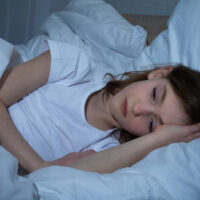Children and adolescents who are experiencing difficulties with their mental health also often struggle with their sleep. Indeed disrupted or altered sleep has been associated with most psychiatric disorders (Gregory & Sadeh, 2016). Although a range of sleep difficulties can co-occur with mental health problems, a common difficulty is insomnia. As such this guidance will primarily focus on difficulties with getting to sleep and staying asleep.
Sleep
-

Catching some zzz’s – Sleep, Sleep Hygiene, and Wellbeing
This World Sleep Day (15 March) we encourage you to explore the learning opportunities available on our website and learn more about the importance of sleep health in children and young people. Help us to raise awareness of sleep health through sharing with your networks and colleagues.
Read more -

The BAby’s Sleep Questionnaire: Infant Sleep and Parental Understanding and Misperceptions
In this Papers Podcast, Professor Sooyeon (Aly) Suh discusses her co-authored JCPP paper ‘Validation of the Parental Understanding and Misperceptions about BAby’s Sleep Questionnaire using auto-videosomnography’. There is an overview of the paper, methodology, key findings, and implications for practice.
Read more -

Predicating Responses to Insomnia Prevention Programme in Subgroups of At-Risk Adolescents
In this Papers Podcast, Dr. Si-Jing Chen discusses her JCPP paper ‘Subtyping at-risk adolescents for predicting response toward insomnia prevention program’. Si-Jing is the first author of the paper. There is an overview of the paper, methodology, key findings, and implications for practice.
Read more -

The role of sleep in adolescent mental health – Presented by Dr. Faith Orchard as part of the ‘Professor Judy Dunn Webinar Series’ – Recording
As part of the ‘Professor Judy Dunn Webinar Series’ we were delighted to welcome Dr. Faith Orchard,Research Psychologist, and Lecturer in Psychology at the University of Sussex. Faith shared her expert knowledge and insights into how sleep changes during adolescence, and how treatments for insomnia can be used to inform some simple healthy habits for improving sleep.
Read more -

Melatonin Use and the Risk of Self-Harm and Unintentional Injuries in Youths
In this Papers Podcast, Dr. Marica Leone discusses her JCPP paper ‘Melatonin use and the risk of self-harm and unintentional injuries in youths with and without psychiatric disorders’. Marica is the first author of the paper.
Read more -

The role of sleep in adolescent mental health – Presented by Dr. Faith Orchard as part of the ‘Professor Judy Dunn Webinar Series’
As part of the ‘Professor Judy Dunn Webinar Series’ we are delighted to welcome Dr. Faith Orchard, Research Psychologist, and Lecturer in Psychology at the University of Sussex. Faith will share her expert knowledge and insights into how sleep changes during adolescence, and how treatments for insomnia can be used to inform some simple healthy habits for improving sleep.
- Event type
- Live Stream
- Location
- LIVE STREAM
-

Are some children genetically predisposed to poor sleep? A polygenic risk study in the general population
Open Access paper from the JCPP – ‘Children who are genetically predisposed to insomnia have more insomnia-like sleep problems, whereas those who are genetically predisposed to longer sleep have longer sleep duration, but are also more awake during the night in adolescence.’ Desana Kocevska (pic) et al.
Read more -

Subtyping at-risk adolescents for predicting response toward insomnia prevention program
Open Access JCPP paper – ‘Adolescents at risk for insomnia can be classified into different subgroups according to their psychological profiles, which were associated with differential responses to the insomnia prevention program.’ Si-Jing Chen et al.
Read more -

The interaction between polygenic risk and environmental influences: A direct test of the 3P model of insomnia in adolescents
Open Access paper from the JCPP – ‘This work sheds light on the complex relationship between genetic and environmental factors implicated for insomnia.’ Juan J. Madrid-Valero (pic) et al.
Read more -

Report from a randomized control trial: improved alignment between circadian biology and sleep–wake behavior as a mechanism of depression symptom improvement in evening-type adolescents with depressive symptoms
Open Access paper from the JCPP – ‘These results provide novel evidence for improved alignment between circadian biology and sleep–wake behavior as a specific mechanism of depression improvement, provide key clues into the complex relationship between sleep and depression, and have significant clinical implications for adolescents with depression.’ Lauren D. Asarnow (pic) et al.
Read more